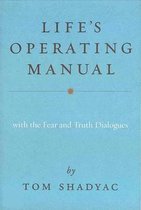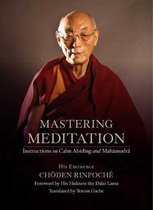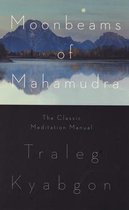Making Sense of Mind Only Why Yogacara Buddhism Matters
Afbeeldingen
Artikel vergelijken
Auteur:
William S Waldron
- Engels
- Paperback
- 9781614297260
- 07 november 2023
- 384 pagina's
Samenvatting
Through engaging, contemporary examples, Making Sense of Mind Only reveals the Yogacara school of Indian Buddhism as a coherent system of ideas and practices for the path to liberation, contextualizing its key texts and rendering them accessible and relevant.
The Yogacara, or Yoga Practice, school is one of the two schools of Mahayana Buddhism that developed in the early centuries of the common era. Though it arose in India, Mahayana Buddhism now flourishes in China, Tibet, Korea, Vietnam, and Japan. While the other major Mahayana tradition, the Madhyamaka (Middle Way), focuses on the concept of emptinessthat all phenomena lack an intrinsic essencethe Yogacara school focuses on the cognitive processes whereby we impute such essences. Through everyday examples and analogues in cognitive science, author William Waldron makes Yogacaras core teachingson the three turnings of the Dharma wheel, the three natures, the storehouse consciousness, and mere perceptionaccessible to a broad audience. In contrast to the common characterization of Yogacara as philosophical idealism, Waldron presents Yogacara Buddhism on its own terms, as a coherent system of ideas and practices, with dependent arising its guiding principle.
The first half of Making Sense of Mind Only explores the historical context for Yogacaras development. Waldron examines early Buddhist texts that show how our affective and cognitive processes shape the way objects and worlds appear to us, and how we erroneously grasp onto them as essentially realperpetuating the habits that bind us to samsara. He then analyzes the early Madhyamaka critique of essences.
This context sets the stage for the books second half, an examination of how Yogacara texts such as the Samdhinirmocana Sutra and Asangas Stages of Yogic Practice ( Yogacarabhumi) build upon these earlier ideas by arguing that our constructive processes also occur unconsciously. Not only do we collectively, yet mostly unknowingly, construct shared realities or cultures, our shared worlds are also mediated through the storehouse consciousness ( alayavijñana) functioning as a cultural unconscious. Vasubandhus Twenty Verses argues that we can learn to recognize such objects and worlds as mere perceptions ( vijñaptimatra) and thereby abandon our enchantment with the products of our own cognitive processes. Finally, Maitreyas Distinguishing Phenomena from Their Ultimate Nature ( Dharmadharmatavibhaga) elegantly lays out the Mahayana path to this transformation.
In Waldrons hands, Yogacara is no mere view but a practical system of transformation. His presentation of its key texts and ideas illuminates how religion can remain urgent and vital in our scientific and pluralistic age.
The Yogacara, or Yoga Practice, school is one of the two schools of Mahayana Buddhism that developed in the early centuries of the common era. Though it arose in India, Mahayana Buddhism now flourishes in China, Tibet, Korea, Vietnam, and Japan. While the other major Mahayana tradition, the Madhyamaka (Middle Way), focuses on the concept of emptinessthat all phenomena lack an intrinsic essencethe Yogacara school focuses on the cognitive processes whereby we impute such essences. Through everyday examples and analogues in cognitive science, author William Waldron makes Yogacaras core teachingson the three turnings of the Dharma wheel, the three natures, the storehouse consciousness, and mere perceptionaccessible to a broad audience. In contrast to the common characterization of Yogacara as philosophical idealism, Waldron presents Yogacara Buddhism on its own terms, as a coherent system of ideas and practices, with dependent arising its guiding principle.
The first half of Making Sense of Mind Only explores the historical context for Yogacaras development. Waldron examines early Buddhist texts that show how our affective and cognitive processes shape the way objects and worlds appear to us, and how we erroneously grasp onto them as essentially realperpetuating the habits that bind us to samsara. He then analyzes the early Madhyamaka critique of essences.
This context sets the stage for the books second half, an examination of how Yogacara texts such as the Samdhinirmocana Sutra and Asangas Stages of Yogic Practice ( Yogacarabhumi) build upon these earlier ideas by arguing that our constructive processes also occur unconsciously. Not only do we collectively, yet mostly unknowingly, construct shared realities or cultures, our shared worlds are also mediated through the storehouse consciousness ( alayavijñana) functioning as a cultural unconscious. Vasubandhus Twenty Verses argues that we can learn to recognize such objects and worlds as mere perceptions ( vijñaptimatra) and thereby abandon our enchantment with the products of our own cognitive processes. Finally, Maitreyas Distinguishing Phenomena from Their Ultimate Nature ( Dharmadharmatavibhaga) elegantly lays out the Mahayana path to this transformation.
In Waldrons hands, Yogacara is no mere view but a practical system of transformation. His presentation of its key texts and ideas illuminates how religion can remain urgent and vital in our scientific and pluralistic age.
Productspecificaties
Wij vonden geen specificaties voor jouw zoekopdracht '{SEARCH}'.
Inhoud
- Taal
- en
- Bindwijze
- Paperback
- Oorspronkelijke releasedatum
- 07 november 2023
- Aantal pagina's
- 384
Betrokkenen
- Hoofdauteur
- William S Waldron
- Hoofduitgeverij
- Wisdom Publications,U.S.
Overige kenmerken
- Product breedte
- 152 mm
- Product hoogte
- 25 mm
- Product lengte
- 226 mm
- Verpakking breedte
- 152 mm
- Verpakking hoogte
- 25 mm
- Verpakking lengte
- 226 mm
- Verpakkingsgewicht
- 544 g
EAN
- EAN
- 9781614297260
Je vindt dit artikel in
- Categorieën
- Taal
- Engels
- Boek, ebook of luisterboek?
- Boek
- Beschikbaarheid
- Leverbaar
- Select-bezorgopties
- Vandaag Bezorgd, Avondbezorging, Zondagbezorging, Gratis verzending
Kies gewenste uitvoering
Bindwijze
: Paperback
Prijsinformatie en bestellen
De prijs van dit product is 20 euro en 99 cent.
Verkoop door bol
- Prijs inclusief verzendkosten, verstuurd door bol
- Ophalen bij een bol afhaalpunt mogelijk
- 30 dagen bedenktijd en gratis retourneren
- Dag en nacht klantenservice
Bezorgopties
- Vandaag nog in huis (bestel ma-vr voor 12:00, bezorging tussen 17:00 en 22:00)
- Doordeweeks ook ’s avonds in huis
- Ook zondag in huis (bestel voor za 23:59)
Shop dit artikel
Rapporteer dit artikel
Je wilt melding doen van illegale inhoud over dit artikel:
- Ik wil melding doen als klant
- Ik wil melding doen als autoriteit of trusted flagger
- Ik wil melding doen als partner
- Ik wil melding doen als merkhouder
Geen klant, autoriteit, trusted flagger, merkhouder of partner? Gebruik dan onderstaande link om melding te doen.








